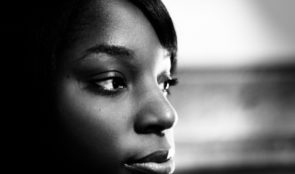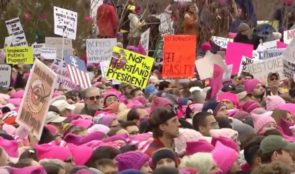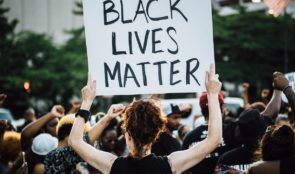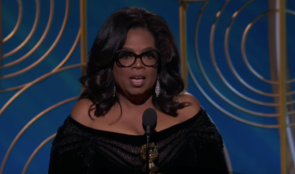My daughter and I were in the grocery store and a very friendly white couple happened to be alongside us in the aisle. My five-year-old daughter’s hair was braided with beads on the ends. She was bouncing along and the woman in the aisle touched one of my daughter’s braids and said it was beautiful.
In the short period of time, I had to react, two scenarios played in my mind. The first scenario: This woman was out of her mind and I should tell her how rude it is to touch any part of a stranger’s body without their permission, especially the hair of a black child. I could then go on to talk about her asserting her privilege and offer a historical context of the ways in which black women and children have been objectified and treated as commodities.
In the second scenario, I could simply thank her for the compliment and get the heck out of that aisle. On this particular day, I chose the latter.
I have made it a priority to teach my daughter that her hair is her personal space and no one has the right to touch her hair.
So when she told me that children at school were touching her hair, we had a kindergarten-level conversation about the experience. In that moment, I talked to her about how unique her hair is and that she can be proud of it, no matter what it looks like and what the texture is. She told me children did not ask before touching her pigtails. I asked her if she was okay with her classmates touching her hair, to which she responded no. Then we talked about the fact that she is in control of her body, including her hair. If she did not want someone to touch her hair, she would need to say it loud and clearly that she did not like the touching and they should not touch her hair again. If it continued, she had every right to swat their hand for invading her space.
Since early African civilization, hair and hairstyles have been an integral part of African and African American culture. Hair and hairstyles often represented an individual’s tribe and family status. According to Lori Tharps, a co-writer of the book Hair Story, which focused on the history of black hair, the hair and hairstyle communicated a tremendous amount about that individual’s identity. For instance, when going to war in modern Senegal and The Gambia, the men wore a braided style, while women in mourning would select a simple style if she styled her hair at all. People believed that the hair was the closest body part to God, therefore embodied a spiritual presence.
I think about the pride I have in my culture and I appreciate the versatility I can represent through my and my daughter’s hair. Other black women feel the same.
Recently, actress and Oscar winner Lupita Nyong’o’ criticized Grazia magazine for photoshopping her hair. She said the magazine changed her hair and smoothed it out to “fit a more Eurocentric notion of what beautiful hair looks like.” The British magazine apologized.
I can recall spending hours as a young girl getting my hair braided or curled just right for a special occasion. It was a special experience that I would come to appreciate years later. I would spend time with my mother braiding my hair, having to keep still so that she didn’t swat my hand as I fidgeted. If I was lucky enough to go to the salon, I would encounter many women who would give me candy and smile as we all sat patiently, waiting for our turn to have our hair transformed. Time and care went into each hairstyle.
I pride myself in my ability to dramatically change my hair regularly. Long, short, curly, straight, ponytail, bob-style, braids – you name it, I’ve tried it. I encourage people to be willing to talk about difference and think about how your actions may be perceived.
Who knows, perhaps my daughter was the first black person this woman had seen so close enough to be able to touch her hair and understand the difference in texture from her own hair.
But on the other hand, I am a black woman who understands the historical context of black women’s bodies, hair included, as commodities.
Given this experience, as the mother of a black child who has had her hair admired, but also touched without invitation, I would like to offer a few basic suggestions, including things for parents to consider as they talk to their children:
-
Keep your hands to yourself. Hopefully, you were taught in kindergarten how important it is to keep your hands to yourself. Even in moments of excitement or curiosity, you do not have the right to invade someone’s personal space – that includes hair.
-
Ask for permission at your own risk. If you are curious, it is okay to ask for permission to touch. But you should not be surprised or let your feelings get hurt if you are told no. Just because you ask does not mean you will get what you want. No matter how well-meaning you may be, it is objectification.
-
Respect the cultural or personal significance. In some cultures, hair is more than something that keeps our heads warm. It can represent heritage, pride, status, tribal affiliation, overcoming obstacles, and even life. Because you may not know what hair embodies for each individual, simply respect that it is personal and you do not have to know.
-
Ask questions. In your efforts to embrace difference, it is okay to demonstrate curiosity. But take the social cues. Not everyone has the time or willingness to educate every individual who has questions about their hair texture, style, and products.
I do not mind having conversations about hair and how important it is in my life and within my culture. In fact, I welcome that opportunity to share that piece of who I am. Just don’t touch my hair.
Cheree L. Meeks is director of the first year experience in the Honors College at the University of Arizona and is a public voices fellow with The OpEd Project.
Worth your time
- Non Gamstop Casinos UK
- Best Non Gamstop Casinos 2025
- Non Gamstop Casinos UK
- Non Gamstop Casinos UK
- Casinos Not On Gamstop
- Casinos Not On Gamstop
- Casino Not On Gamstop
- Casino Italiani Non Aams
- Online Casino Canada
- Non Gamstop Casinos Uk
- Best Non Gamstop Casinos
- Meilleur Casino En Ligne France
- Casino Sites Not On Gamstop
- Non Gamstop Casino Sites UK
- Casino Online Non Aams
- Casino Sites Not On Gamstop
- Non Gamstop Casinos
- Meilleur Casino En Ligne France
- Meilleur Casino En Ligne Francais
- Casino Sites Not On Gamstop
- Non Gamstop Casinos UK
- Casinos Not On Gamstop
- Migliori Siti Casino Non Aams
- Meilleur Casino En Ligne
- Casino Non Aams
- Meilleur Casino En Ligne Belgique
- Siti Non Aams
- Tennis Paris Sportif
- Site De Paris Sportif En Ligne
- Casino En Ligne France
- Sweet Bonanza Avis
- ブック メーカー おすすめ
- Online Casino App Real Money
- Casino Français En Ligne
- Casino Italia Non Aams
- Meilleur Casino En Ligne Belgique
- Meilleurs Casino En Ligne
- Nouveau Casino En Ligne
- Casino Con Crypto
- Best Crypto Casino















I think this is very interesting and true. Be curious, ask, but don’t touch. Thank you Mrs. Meeks for the article.
Bravo Dr. Meeks; our hair, our bodies, our personal space is our private commodity. No one has the right to invade those areas. Teaching our children to deny access is important as well as reporting the violation. Teachers and other community members need to be included so we can protect ourselves from this offense!
Bravo Dr. Meeks. No one has the right to invade our hair, body and personal space. Teachers and the Community needs to be aware of this violation and pass on this forbidden practice as unacceptable!
Love it, Dr. Cheree for bringing this to the forefront once again! It takes me back to times of slavery when various parts of our bodies were examined and touched to determine purchase price, cost and ultimate value. We are human beings with pride and integrity, not property to be probed and touched.
We experienced a similar experience that had to be nipped in the bud once made of aware of it. Again, I agree with you and am so thankful you took the moment to make it a ‘teachable moment.’
Very nicely written. People need to respect personal space.
Thank you for articulating what so many women (and their daughters and sons) have experienced, but have kept silent about. Yes, our hair is beautiful, and no one has the right to reach out and touch it just because they want to. Great article, Dr. Meeks!
Great article Dr. Meeks. I am passing this along to everyone person I know. So many need to be educated on this topic.
I really enjoyed reading this Cheree! Look forward to reading and learning more.
Well said. It always astounds me when people comment negatively on or reject the notion of black hair. I grew up in the 60s and remember some of the amazing naturals that my friends adopted that shocked my parents and many of my friends’ parents. When people reach out to touch like that, they have lost view of the person and are focusing instead on an object - in this case, a hairstyle. Yet, hairstyle is an expression of the person and should be appreciated as such. Thank you for this article, I will be sure to pass it along.